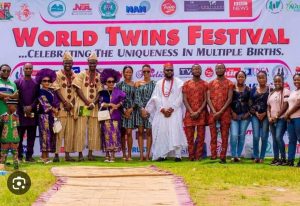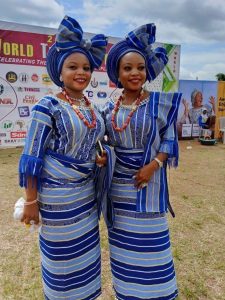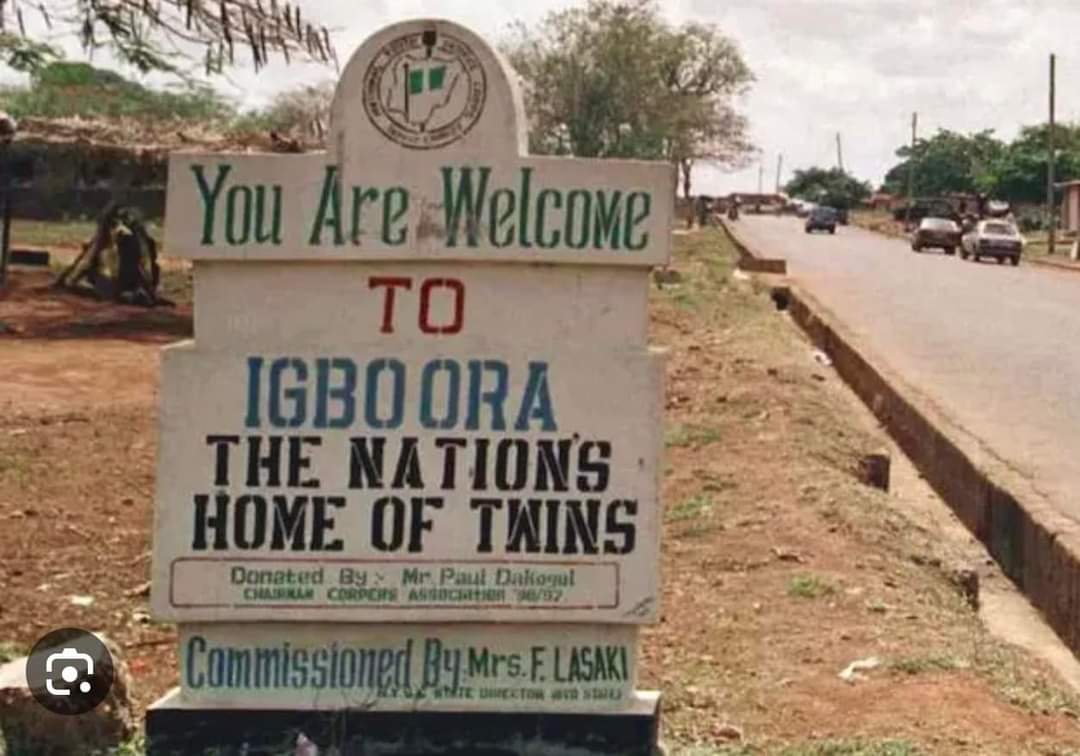You Dread Giving Birth To Twins? Don’t get pregnant anywhere near Igbo-Ora. Welcome to a Nigerian town with the highest concentration of twins in the world, and how their forebears were once chased away by mosquitoes + PHOTOS
No Town or single community anywhere in the world has more twins than this Nigerian village of Igbo Ora, which now hosts #WorldTwinsDay every year around September/October.
Platforms Africa reports that Igbo-Ora is a city and the headquarters of Ibarapa Central, Oyo State, south-western Nigeria, situated 80 kilometres (50 mi) north of Lagos. In 2006 the population of the town was approximately 72,207 people. In 2017 the population is estimated to be around 278,514 people.
History of Igbo-Ora
Obe Alade, a descendant of Alaafin of Oyo with his family, according to legends, migrated from Oyo town several centuries ago following a chieftaincy tussle and when he and his kinsmen lost the contest, (As usual in those days, once you lost any chieftaincy tussle, people tend to leave the town). While coming from Oyo town, Obe Alade and his kinsmen came with idols mainly Egungun and Alaale, which they worshiped.
READ ALSO: Hamar: African Tribe Where Wives Beg Husbands To Flog Them For Love, Loyalty
Ìlú Àjé: Untold Story Of The ‘Town Of Witches’ In Oyo
Marry, Divorce or Die, You Have Fingers To Lose; Damn Tale of Dani Tribe
Dinka Ethnic Group: Tales of World’s Tallest Tribe
No Fat, No Prize: Bodi Tribe Where Only Fattest Men Are Heroes
Ovahimba and Ovazimba: African Tribes Where Free Sex Is Offered To Guests

First Settlement
Obe Alade and his family first settled at a forest name after them, a forest of immigrant (Awon to sako wa lati Oyo). Igbo-Asako, about three kilometers away from the present-day Igbo-Ora market.
It was at Igbo-Asako that Obe Alade became the first Baale of Igbo-Ora (Now Olu of Igbo-ora) as usual for a founder, hence the appellation “Omo Igbo-Ora Lasako”. The scarcity of drinking water and mosquitoes’ bites drove out the Igbo-Ora people From Igbo-Asako forest.

Hence the appellation “Bi o ri emo ri, ki o nso ni Igbo-Ora Lasko, abongangan ibr ju esi ode lo, yanmuyanmu ibe ju ikamudu” meaning “If you want trouble, go to Igbo-Ora in Asako where mosquitoes are as big as hunter flies and bigger than other insects.”
Second Settlement
Due to unfavorable conditions, harsh weather, and insect bites, they left Igbo-Asako. Igbo-Ora people now found another site called Igbo-Ayin near Ayin River, and they settled there. They relied on this Ayin river for drinking water and other domestic purposes. There is a flat rock, and on that rock, they established a big market called “Apata Itaja” Market.[citation needed]
Third Settlement (Last Settlement)
The Igbo-Ora people left Igbo Ayin to find another forest which was in a marshy and swampy area (“Ira”) an unseasonal river called Igbo-Ira (Igbo inu Ira) and the present site. It is here the town derived its name when people refer to the people of the settlement as Omo Igbo-Ira later it was shortened as Igbo-Ora.

READ ALSO: President Biden Trips, Tumbles On Air Force Stage
BREAKING: 80 Year-Old US President Biden Announces Re-Election Bid
PREPARE: NLC Threatens To Begin Nationwide Strike Wednesday
Electricity, Water Tariff Hike Begins – Ghana Utility Authority
United Nations Institute Names Adeola Yusuf Panelist For African IDEP Event
Tinubu Reads Riot Act To Service Chiefs On Oil Theft, Insecurity
At each of the above settlements people name the town with a prefix of the forest:
Igbo-Asako
Igbo-Ayin
Igbo-Ora

This led to the appellation they gave to the people “Omo Igbo-Ora Lasako” in other to link them with their Original settlement.
Twin Capital of the World
The unusually large number of twin births in the region has earned the town the nickname Twin Capital of the World. This phenomenon of a large number of twin births is not unique to Igbo-Ora; it has also been observed in the town of Kodinji in India, and Cândido Godói in Brazil.
There is no proven scientific explanation for the high rate of twins in Igbo-Ora, a city of at least 200,000 people 135 kilometers (83 miles) south of Nigeria’s largest city, Lagos. However, many in Igbo-Ora believe it can be traced to women’s diets.
The town is the location of Oyo State College of Agriculture. The college has contributed significantly to the socio-economic and demographic development of the town. The Oyo state government has also approved a High Court of Justice. The federal government is also said to have approved the location of a police training college in the town.
The community and other stakeholders like the state government and private sectors now organize an annual “Twin Festival,” where twins from Igbo-Ora and elsewhere gather to celebrate their existence.
Igbo Ora World Twin Day attracts tourists to the community, especially during the festival. Beyond the festivals, tourists and researchers always troop to Igbo Ora on a fact-finding mission.
There is no scientific proof behind why people from Igbo Ora bear more twins than every other community. Some assume that it could be the type of food they eat.
Last line
The mystery behind the concentration of twins in the Igbo Ora community attracts many to the community.
The Igbo-Ora twins mystery is one of the reasons Nigeria is a big name among the comity of nations where childbirth is almost always in twos.
Source: Platforms Africa





